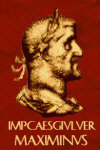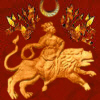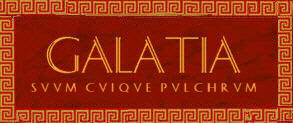



| After a term of Imperial service as Praetrix of Tarraco in Hispania, I was called home to my own people, the Galatians, to serve Roma and our Imperator as a provincial governor with the title of Legata Augusti Pro Praetore. It is thus my pleasure to offer you, my guest, a brief tour of our Provincia and tell you something of our proud history, and how we came to play a role in humanity's greatest empire. Permit me to begin with a brief history of this land and people. Galatia is situated wholly in the interior of the Anatolian peninsula. You may be surprised to learn that we are also Celts, no less than our cousins in the western parts of the Empire. In fact, our Celtic origin is revealed in the very name of this land, as you find within it the letters C/G-L-T. We Celts have truly wandered about the world and settled this land early in the sixth century of Rome's founding. Even the name of our capital, Ancyra, reflects those sea-journeys of old. It means "anchor", though situated so far inland. Now Anatolia was already a place of ancient and mysterious civilizations reaching back to time immemorial. Some of the world's first cities were built not so far from us, and we are as well heirs to ancient wisdom rivalling anything of Egypt. This is the homeland of Magna Mater, Cybele, the Great Mother of the Gods who has been honored as the savior of Rome in the dark days of the war with Hannibal. Her magnificent Temple on the Palatine in Rome well conveys the feeling of the more ancient shrine at Pessinus, here within the present borders of Galatia. It was from Pessinus that the Sibylline Books called Her to Rome's blessing as Caput Mundi, and so shall Rome be ever faithful to the Mother's rememberance! |
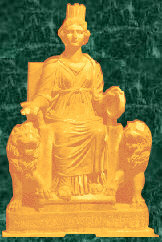
| We are a diverse province also, as among us also came the Phrygians, Hellenes, Cappadocians, Bithynians, and others. Greek culture has long been established as our people became increasingly settled; and it is the might of Rome that has been paramount in that cultivation, particularly with the construction of a grand network of roads to improve transport, trade, and communications. Some parts of Galatia remain oriented to the nomadic way of life and tribal identifications have by no means disappeared. Around my fortified provincial capital of Ancyra, the Tectosages are the main tribe, and many have served proudly in the legions of Rome. Tavium is the tribal center of the Trocmii, as is Pessinus for the Tolistobogii. We are not so distant from the frontier states of Armenia and Mesopotamia, where the Persian threat has erupted in recent years under Ardeshir. The absorption of previously tamed Parthia by this vigorous and expansionist realm has given new strategic importance to Galatia and our neighboring provinces. It was because of this strategic importance even in Vespasian's time, that the governor of Galatia was then elevated to consular rank. |
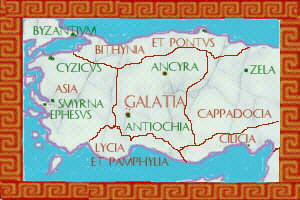
| Returing to centuries past, a Galatian king, Deiotarus had been a good ally of Rome, but had sided with Pompey and against Julius Caesar in the civil wars of the time, hoping to regain the territories which he had lost through the censure of P Clodius Pulcher. Deiotarus reversed himself and aided Caesar at the battle of Zela ... when Caesar's defeat of Pharnaces prompted that laconic phrase, "veni, vidi, vici." The boundaries of Galatia were partly restored, but were reduced somewhat under the reigns of Hadrian and Antoninus Pius. A noted city in the southwest of Ancyra was established by Augustus as Caesaria Antiochia shortly after the death of the king Amyntas. This area, Pisidia, was something of an ungovernable place before this time, but it was settled by former legionnaires of V and VII Gallica, if I recall correctly, those who did much to make this Antioch a near rival of the venerable Syrian city of the same name. Nowadays Galatia is home to the Legion XII Fulminata, with XV Apollinaris long based in Cappadocia, just to our east. I will show you the great baths constructed by Caracalla as well as the beautiful Temple dedicated by the Galatian king Pylamenes during the very lifetime of Augustus. Yes, we have long been intimately connected with Rome and Her destiny! |
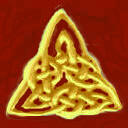
| Part of the sacred river Sangarios flows through the Phrygian northwestern sector of our province; drinking its waters is said to be hazardous for the men because it will induce in them the divine madness to take up the tympanum and follow Cybele. I say it is no madness ... though drink from there at your own risk. I prefer to offer my guests a fine Hispanian vintage which I found so pleasant during my years in Tarraco. Yet another famous city in Galatia is Gordium, where great Alexander solved the puzzle of the Gordian knot by such unconventional yet effective means. To this day, the Celts have often employed the mystical insignia of the interwoven knot. Aha, here is one which I wear as a pendant charm. The knot is much like the interwoven story of gods, princes, and people is it not? Yet, if sliced through too directly it all unravels into meaningless shreds and the mystery vanishes. Well, I expect not to govern this province in the mode used by Alexander, for all that is but drama which unravels too soon. Good Roman governors know the Orient, as I do, to be lands where ornate knots of history, culture, and intrigue respond to finesse more readily than to hastily considered force. |
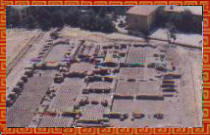
| Ah, my friend, speaking of such matters, you have remarked on the significant populations of Nazarenes living in Galatia. I assure you that those among our people have never caused the troubles recounted elsewhere. Not to say that some instigators from outside the province have not on occasion created some unpleasant incident, but permit me to introduce you to some of these adherents among the Galatians ... those who see in Mary and Jesus a new ephipany of the Mother and Her Son. The Mother has been manifest in many names over a myriad of years, and it is no less true of the pure Shepherd boy called Attis in the Phrygian speech. I must tell you next time of the great happenings in this land, in the time of my grandmother, about eighty years ago. The stories concern the Phrygian prophet Montanus and prophetesses Priscilla and Maximilla, still cherished by old ones here and revered by our Galatian Nazarenes; quite intriguing even to such a worldly traditionalist as myself. |
